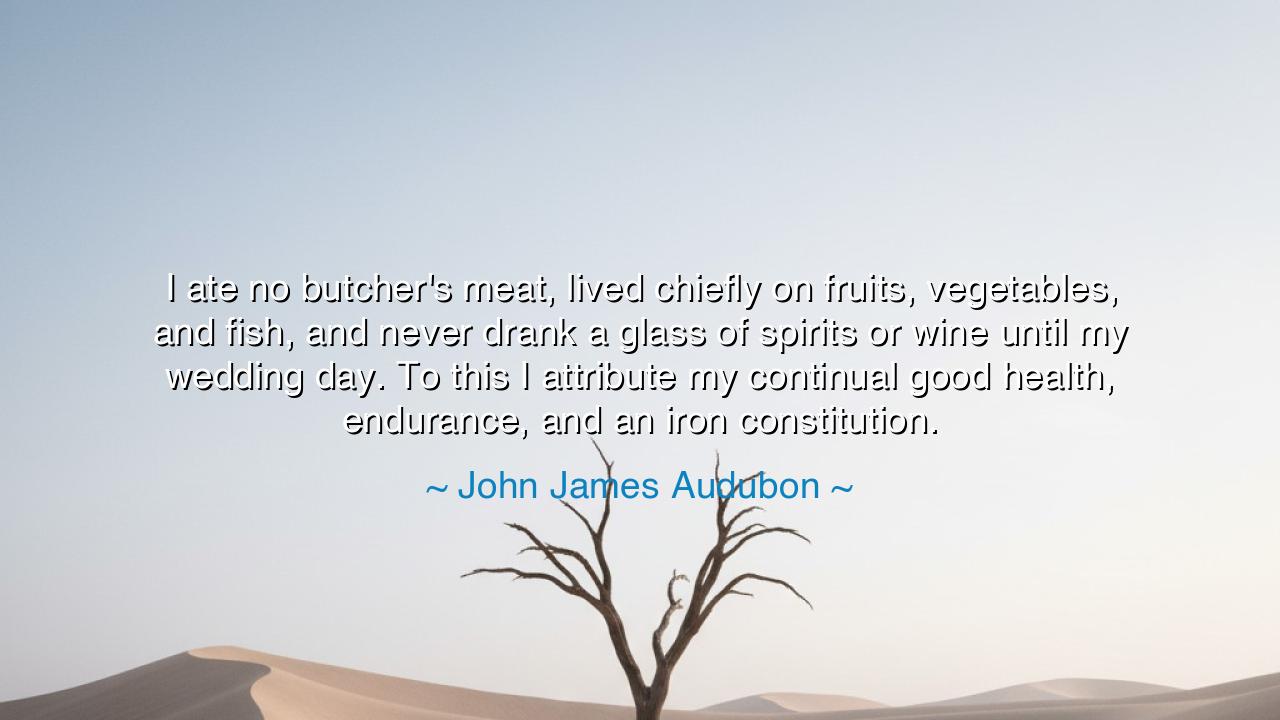
I ate no butcher's meat, lived chiefly on fruits, vegetables
I ate no butcher's meat, lived chiefly on fruits, vegetables, and fish, and never drank a glass of spirits or wine until my wedding day. To this I attribute my continual good health, endurance, and an iron constitution.






In the words of John James Audubon, the great naturalist, we hear the testament of a life disciplined and preserved by moderation: “I ate no butcher's meat, lived chiefly on fruits, vegetables, and fish, and never drank a glass of spirits or wine until my wedding day. To this I attribute my continual good health, endurance, and an iron constitution.” His reflection is not merely about diet—it is a hymn to self-control, a virtue revered by the ancients as the guardian of vitality and the companion of wisdom.
The abstinence from butcher’s meat and strong drink was not, for him, an empty denial, but a conscious choice that shaped both body and spirit. To live simply upon fruits of the earth and creatures of the water was to align himself with nature’s gentleness, avoiding the heaviness that corrupts the body and the excess that dulls the mind. His strength—what he calls an iron constitution—was forged not by indulgence, but by restraint. The lesson is clear: to master the body is to grant the soul a longer dwelling place.
Consider the example of Pythagoras, who likewise rejected the eating of flesh, believing that purity of diet brought clarity of mind and harmony with the universe. His disciples, too, learned that the path of moderation opened the doors of wisdom. In Audubon we see the echo of this ancient truth, that those who would achieve endurance in their labors—whether in study, exploration, or art—must learn first to discipline themselves in the simplest of matters: what they eat, what they drink, how they live.
It is not without meaning that he first tasted wine on his wedding day, for here indulgence is sanctified, not wasted. Joyful occasions invite celebration, but such celebration carries weight only when it is rare. To feast continually is to lose the sweetness of feasting; to drink daily is to forget the sacredness of the cup. By saving this moment of indulgence for his marriage, he transformed it into a symbol, a consecration of love and life’s new beginning.
Thus let this teaching endure: those who would live long, endure hardship, and walk steadfastly in their work must learn the path of moderation. Luxury may tempt, and excess may beckon, but health and endurance spring from simplicity. And when the time comes for feasting—when the vows of love are spoken or the victories of life are won—then let the cup be raised with gratitude. For discipline gives life its strength, and rare celebration gives it its joy.






VVinh
It’s amazing that Audubon could maintain such a strict regimen and attribute it to his health and endurance. But could there be other factors at play? Genetics, mental health, or even daily routines could contribute to longevity as well. What do you think, is a diet like this really the key to great health, or does it just play a part in a much larger picture?
TVPham Le Trieu Vy
It’s intriguing to hear someone attribute their good health to such a specific lifestyle. I feel like many people today would struggle to stick to a similar routine, especially without drinking wine or spirits for so long! Do you think that such extreme restrictions are necessary for a long and healthy life, or are there other, more balanced approaches that might work just as well?
LANguyen Ngoc Lan Anh
Wow, Audubon’s commitment to avoiding alcohol and butcher’s meat is impressive. It seems like he really understood the importance of a disciplined lifestyle when it comes to health. But I’m curious—how many people today would be willing to live like this? Would this kind of diet still be considered the healthiest choice for modern society, or have we evolved with different nutritional needs?
THduong the hoa
This quote really makes me think about how much our diet affects our health. It's interesting that John James Audubon believed his diet of fruits, vegetables, and fish played such a crucial role in his good health. I wonder, though, how much of that is true for everyone? Could changing our diet really have such an immediate impact on our overall well-being, or was it a combination of his lifestyle and genetics?